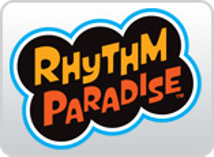1. Rhythm Tengoku: Game Boy Advance
Well, shall we start by talking about the previous game? Rhythm Tengoku was released in the summer of 2006 for the Game Boy Advance (in Japan). To tell you the truth, even though it didn’t attract much attention before its release, it was well-received by many people. Osawa-san, as this series’ chief mastermind, what did you think at the time of release?
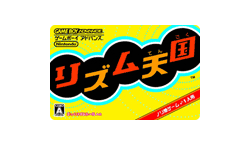
I wondered if everyone would enjoy it. I was extremely unsure about it. Since nothing like a music score appears on the screen, it was a new type of rhythm game, and I thought only certain people would be able to get it. Of course, we did everything we could while making the game to prevent that from happening, but I knew I wouldn’t know until release... I was incredibly nervous...
How did you feel when you saw the response?
I was scared to death as I tracked the game’s reputation on the web, but for the most part it was good, so I was immensely relieved…
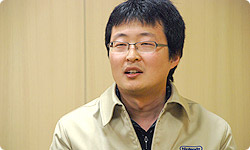
So rather than releasing it boldly, with a great deal of confidence and certainty, you released it in trepidation. But the response was incredibly favourable.
...Yes.
Come to think of it, when the first one came out, the Nintendo DS was generating a lot of attention, so some people wondered why we were bothering to release it for Game Boy Advance.
...That’s right.
Even though the public was paying attention to the new system, I remember you were intent on—one might even say stoic about—the fun of playing something with buttons.
I wanted players to be able to easily play it outside, taking advantage of the Game Boy Advance’s small screen... It turned out the way it did because I had felt that way since the earliest stages of development...
Takeuchi-san, like Osawa-san, you were involved in development from the earliest planning. What did you think about what a hit Rhythm Tengoku was?
Hmm... I knew that Osawa-san, as chief planner, had really invested himself in it, so I wanted to bring his vision to life and give it to the world. (laughs)
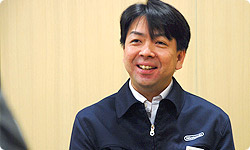
I see. (laughs) That comment says a lot about this team’s atmosphere.
Iwata-san, as I’m sure you already know, Osawa-san can be very particular. He has his own very strong ideas. But he wouldn’t openly express them, so others often don’t understand what he means. You have to be good at reading him. (laughs)
...
He’s a seeker of perfection.
Exactly!
...
He must go down his own path, and you can hear his spirit crying out, “Figure out which way I’m going from the aura that surrounds me!”
Yes, that’s exactly right.
...
So one of your major roles within the team was staying by Osawa-san’s side and following where he went.
Yes. After all, I have faith in his ideas, so I work hard to stick with him. But, when he starts feeling down, he says to me, “You know, if you come with me, you’ll be dragged down, too.”
(laughs)
...
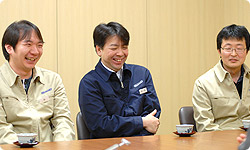
I could sense that Rhythm Tengoku had finally taken shape—and not a moment too soon—after a long searching process.
Yes. I think it embodies a variety of feelings and emotions for us. In a good way.
I seem to remember that everyone on the development staff took dance lessons in order to obtain a shared awareness of rhythm.
That’s right. While we were consulting with Tsunku-san, who supervised the game, about rhythm, he said the fastest way he could make us understand was to have us try dancing, so we all went to Tokyo.
I doubt you thought you’d have to take dance lessons working for Nintendo! Osawa-san, how did the lessons go?
Uh...they were fun.
(laughs)
He looked like he was really enjoying himself. He was extremely busy at the time, and not in the best condition, but his face really lit up!
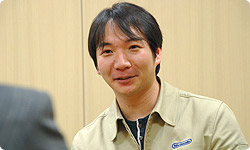
He was even drinking energy drinks before the lessons! I was impressed. I thought, “Now that’s true determination!”
It was...fun.
Ha ha ha ha! But it wasn’t easy, was it?
No.
You’re not exactly the athletic type.
It goes with the job.
It goes with the job, huh? (laughs)
After a while we began to get the hang of it.
Tsunku-san had an easy way of teaching us.
He had a strong desire to improve Japanese people’s sense of rhythm through the game. Which reminds me, we use the word “groove-sense” to describe what’s fun about this game. Osawa-san, did you come up with that word?
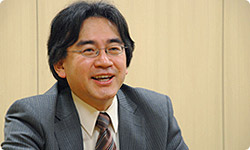
...(thinking)... I’m not sure.
Oh. (laughs)
That period is...a little fuzzy.
Hmm. Fuzzy.
I’m trying to think who it was...
I guess it doesn’t really matter. I just think it’s good that we have such a clear word to describe the game.
Who...was it...?
Really, it doesn’t matter.
Maybe it was Tsunku-san.
Oh, Tsunku-san?
Or maybe we were all just talking and... No, it’s all too fuzzy.
Uh, I can see that. Let’s just set the whole topic aside.
(laughs)
